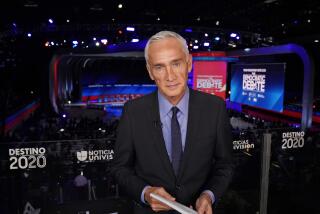The Old Versus el Nuevo
- Share via
Back in 1961, Mexico’s leading media mogul bought a television station in San Antonio, certain there was big money to be made from the millions of mexicanos moving north of the border.
He was right. Emilio Azcarraga Vidaurreta started buying more stations, laying the foundation for the first Spanish- language television network in the United States. But in 1986, federal laws limiting foreign ownership of broadcast stations forced the Azcarraga family to cede control.
Now, Azcarraga Vidaurreta’s 37-year-old grandson is out to regain what his family lost. Emilio Azcarraga Jean, who owns the Spanish-speaking world’s largest media company, Grupo Televisa, has made no secret of his desire to dominate the U.S. Latino market.
He has set his sights on the multibillion-dollar broadcasting and entertainment conglomerate known as Univision Communications Inc. -- the company that his father’s father founded 44 years ago.
“We have built it from scratch,” Azcarraga Jean said in an interview. Although Televisa and Univision have forged a fruitful partnership, he said, eventually “it makes a lot of sense to try to combine the two companies.”
His path to power is blocked, however, by a man twice his age: A. Jerrold Perenchio, the iron-willed chairman and chief executive of Univision.
The 74-year-old Los Angeles billionaire -- a former talent agent and boxing promoter who also is one of California’s biggest political contributors and art collectors -- has spent more than a decade building Univision into a fortress. The Century City-based company’s three networks command more than 75% of the U.S. audience for Spanish-language TV.
Perenchio, who does not speak Spanish, owns 11.5% of the company’s common stock but has super-voting shares that give him 56% control. Lately, he has used that power to unilaterally install one of his closest allies as Univision’s new president, prompting a backlash from some on the board.
Analysts say Perenchio is not about to start sharing power, particularly not with Azcarraga Jean, whose Mexico City-based Televisa owns 10.9% of Univision and provides more than a third of its programming. Perenchio is known for closely following his own 20 “Rules of the Road” -- a printed list, distributed to Univision executives -- which includes the admonition: “Take Options, Never Give Them.”
Perenchio “is clearly in control,” said James Marsh, a media analyst with S.G. Cowen & Co. “But his actions suggest that he feels threatened.” Perenchio, who routinely shuns media attention, declined to be interviewed for this article.
In the short term, the Univision chief cannot be unseated by Azcarraga Jean. U.S. law prohibits the Televisa chief, a Mexican citizen, from holding more than a 25% stake in a U.S. broadcasting company. Still, Perenchio may have reason to worry.
In the long term, Azcarraga Jean seems prepared to reinvent himself, even if it means stepping away from his heritage. As Latin America’s most powerful media executive, he has suggested that he might go so far as to seek U.S. citizenship if it would help him gain the upper hand.
“We’re still looking at that,” he said.
At stake are billions of dollars in advertising revenue. As the U.S. Latino market swells, and as the ranks of middle- and upper-income Latinos continue to grow, more major companies are reaching out to Spanish- speaking consumers.
Already, the buying power of the 40 million Latinos in the United States -- which by some estimates is about $1 trillion a year -- far exceeds the gross domestic product of Mexico, a country of 105 million people.
With so much money up for grabs, the struggle for control of Univision seems as inevitable as it is bitter.
Last month, Perenchio brought long-simmering tensions to a boil when he unexpectedly installed Ray Rodriguez, his longtime lieutenant, as Univision president and chief operating officer.
Azcarraga Jean, who is vice chairman of Univision’s board, was furious. In his view, Perenchio had sidestepped a formal search to ensure that the job went to a personal ally.
At a testy, four-hour meeting in Los Angeles, representatives from Televisa and Venevision, the Venezuela media company that owns 13% of Univision, accused Perenchio of running Univision like a fiefdom instead of a public company.
Univision’s board lacks independent voices, Perenchio’s critics charged. Then they accused him of being irresponsible to shareholders by refusing to come up with a succession plan.
Perenchio angrily told board members that he planned to remain Univision’s chief executive indefinitely, according to a person who was in the room.
Last week, Perenchio delivered that same message to Wall Street. During a conference call with analysts, one of his executives read a statement in which Perenchio downplayed Univision’s conflict with Televisa over such issues as royalties and programming. He called the disagreements “some rain on a very strong and weatherproof roof.”
Perenchio forcefully repeated his intention to stay in his job. “I’m 74 but feel like I’m 47,” he said through his intermediary.
Later that week, at an investors conference in Florida, Azcarraga Jean and his team couldn’t resist poking fun at Perenchio’s penchant for issuing such proclamations through his underlings. Azcarraga Jean’s executive vice president began Televisa’s presentation on a theatrical note, bringing a hush to the room.
“First, I will read a statement from our chairman, Emilio Azcarraga Jean,” Alfonso de Angoitia said. He paused, then smiled. “It’s a joke,” he said, as the crowd broke into laughter.
In an interview, though, Azcarraga Jean delivered a different kind of punch line: “Mr. Perenchio is a good CEO, but he handles [Univision] as if it were a private company. I have a different style.”
He added of the septuagenarian: “He said he feels 47, but I am still 37. He is still 10 years older than me.”
For now, Azcarraga Jean continues to build Televisa, whose stock price has more than doubled in the last two years. Wall Street values Televisa at $9.34 billion -- even more than Univision.
But he also has been spending more time in the United States. Last year he bought a $4.2-million estate in Miami Beach, not far from those owned by music stars Enrique Iglesias and Lenny Kravitz.
On Feb. 19 Azcarraga Jean’s wife gave birth in San Diego, where the couple keeps another residence. Emilio Azcarraga IV is a U.S. citizen, meaning that if he follows in his father’s footsteps, his ambitions will not be limited by federal law.
Azcarraga Jean’s relationship with his own larger-than-life father, who died eight years ago, continues to define him.
A recent edition of the Mexican weekly publication Milenio featured a caricature of Azcarraga Jean as part of a spoof of Mexico’s most powerful people. In it, the multimillionaire was dressed in a uniform that looked several sizes too large. The implication was clear: He still struggles to fill the big shoes of his father, Emilio Azcarraga Milmo, known to all of Mexico as “El Tigre,” or the Tiger.
“El Tigre” was a famously autocratic leader, a man of vast appetites and extravagant gestures. By some accounts, he could spend more than $100 million a year. His British custom-made yacht, called Eco, was 243 feet long, carried a small airplane on the afterdeck and cost an estimated $45 million.
Azcarraga Milmo, who once openly declared himself “a soldier” of the ruling Institutional Revolutionary Party, or PRI, reportedly pledged $50 million to the party at a fundraiser. Under him, Televisa was a government-sanctioned monopoly that dutifully fed its viewers PRI propaganda.
By the time his only son entered the family business at age 20, Televisa was already the world’s preeminent Spanish- language media company. It boasts four television networks, more than 200 TV stations, cable channels and satellite television, radio stations, a feature film production unit and a publishing arm that distributes more than 50 magazines. It also owns three soccer teams and Azteca Stadium in Mexico City, one of the world’s largest, with 105,000 seats.
Azcarraga Jean’s initial jobs carried little authority. “Little Emilio,” as he was called then, took years to work his way up within Televisa. In 1997, when he was named to lead the family dynasty just a month before his father died, he immediately had to fend off family members vying for the fortune and to grapple with $1.3 billion in debt. He was 29.
“No one really gave him much of a chance, thinking he was too young, too wet behind the ears,” said Andrew Paxman, coauthor of a biography of Azcarraga Jean’s father.
Azcarraga Jean hired a few trusted friends, his cuates, including two boyhood pals. They went to work cutting thousands of employees from the bloated payroll, including 46 vice presidents, and sold off assets, including an art museum and company jets, to shore up the company’s finances.
Then, in a deliberate attempt to distance himself from his father, Azcarraga Jean declared that he was more interested in money than politics.
“He announced that he was a businessman,” said Sallie Hughes, a journalism instructor at the University of Miami. “He declared his independence from any one political party and pledged his allegiance to the markets.”
Finally, he was commanding some respect. The Mexican press started calling him “El Tigrillo,” or the Little Tiger. Rivals took notice.
“This is a guy who stepped into a situation where he was in way over his head,” said Jim McNamara, president and chief executive of NBC Universal’s Spanish-language network, Telemundo, Univision’s top competitor. “He has had the capacity, the intelligence and a good group of advisors to rise to the occasion.”
Said Paxman, the biographer: “He started to show that he had some of his father’s business gumption.... He’s proved a lot of people wrong.”
Hampering Azcarraga Jean’s ambitions, however, is an unusual pact forged in 1992. That year, when “El Tigre” joined with Perenchio and Venevision to acquire Univision from Hallmark Cards Inc., the trio hammered out an agreement that gave Univision exclusive use of Televisa’s programming in the United States until 2017.
That agreement yielded $105 million in royalties for Televisa last year. But there are those who say Televisa could make more if it was allowed to shop its wildly popular telenovelas to the highest bidder.
Televisa produces 50,000 hours of the soap operas each year and sells them all over the world: from Buenos Aires to Brussels, Bombay to Beijing, and even to the Vatican.
In the United States, they can be seen only on Univision, where each weeknight they fill three prime-time hours. Routinely, they crush the competition, in large part because about 65% of U.S. Latinos are from Mexico or of Mexican descent.
“What Univision represents for immigrants from Mexico is a home away from home,” said Monica Gadsby, managing partner of Tapestry, an ad firm specializing in Spanish-language media. “It’s that nostalgia for Mexico that gets the viewers to Univision in the first place.”
Three years ago, Perenchio set out to show Televisa that Univision, too, could produce successful soaps. He launched his own project: “Te Amare en Silencio” (I Will Love You in Silence). Almost immediately, it was behind schedule and over budget. When early episodes were sent to Perenchio’s partners for review, a fatal flaw was easy to spot: Its protagonist was a man, a deviation from Televisa’s tried-and-true formula of building the story around a woman.
“It was a disaster,” Telemundo’s McNamara recalled with a laugh. “The lead character was in love with a woman who could not speak. She was mute!”
Still, Perenchio could not be persuaded to pull the plug. The show went on the air in the crucial 9 p.m. slot in late 2003. Univision’s ratings plunged -- the network lost about a quarter of its loyal viewers.
That kind of misstep bolsters Azcarraga Jean’s belief that he deserves to hold more sway at Univision.
Until 2017, when the programming pact expires, he said, he plans to explore the U.S. market through magazine and radio ventures and partnerships with Hollywood studios.
Asked whether he hoped his son would join the family business, Azcarraga Jean said it was too early to speculate about the infant’s career. But he dismissed the notion that he planned to use his son’s U.S. citizenship to win the same for himself.
Under federal immigration law, a U.S.-born child can apply for citizenship for his parents when he or she turns 21. But that doesn’t fit with Azcarraga Jean’s timetable for expansion into the lucrative U.S. Latino market.
“I would have to wait,” he said. “That’s not the idea.”
More to Read
Sign up for Essential California
The most important California stories and recommendations in your inbox every morning.
You may occasionally receive promotional content from the Los Angeles Times.












